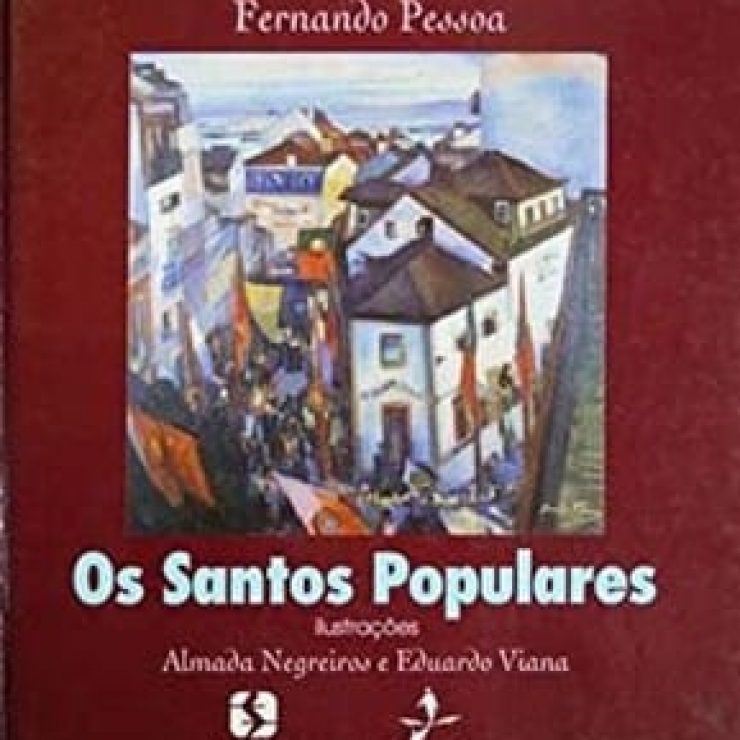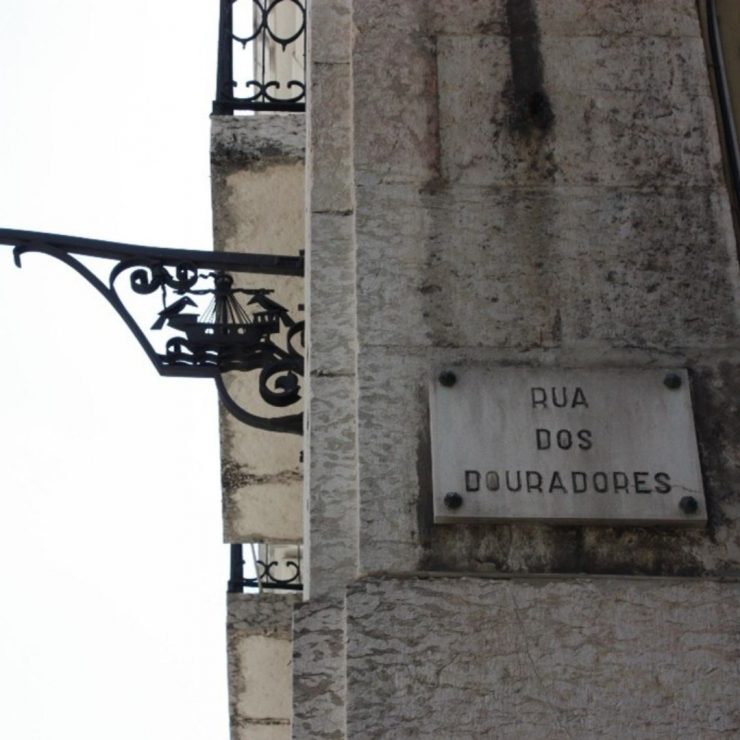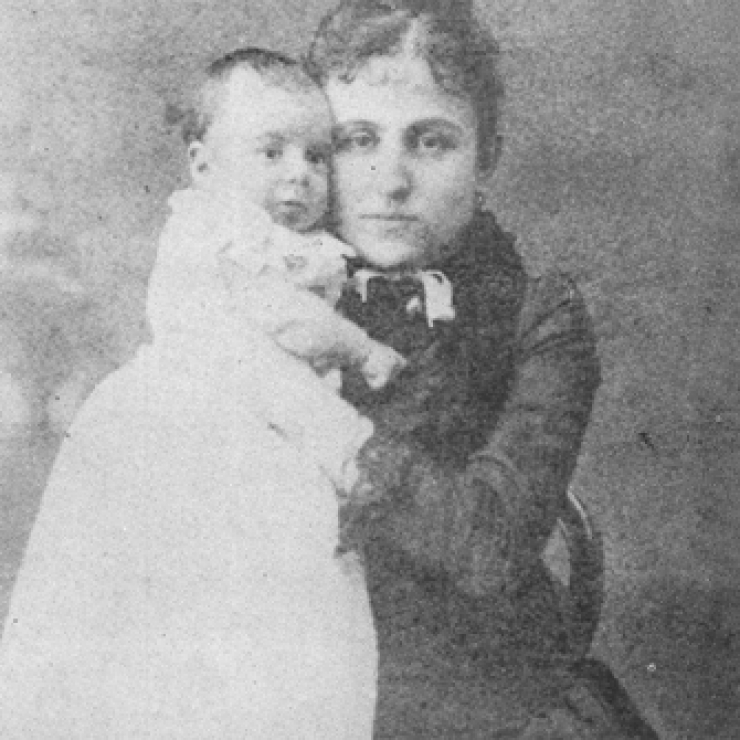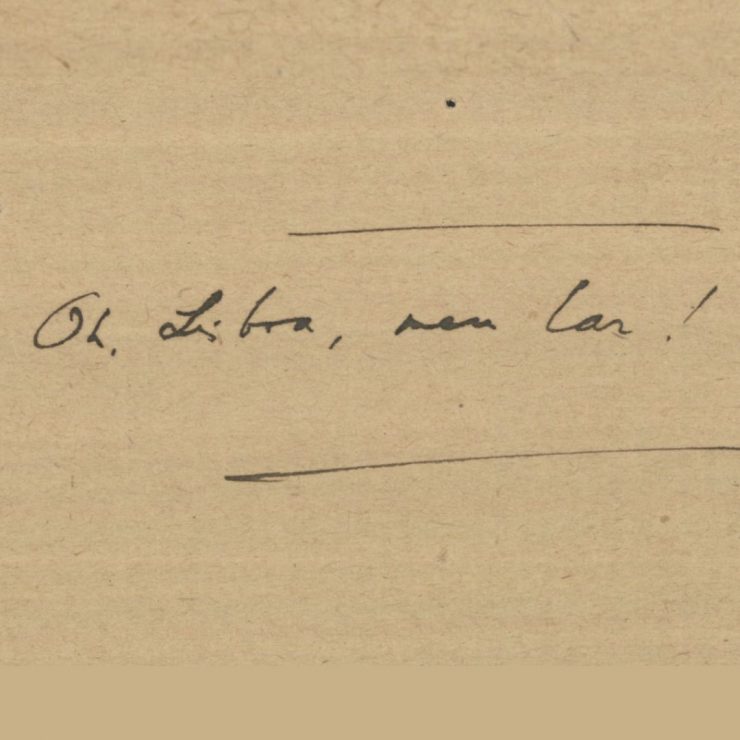Here we propose the reading of five poems by Fernando Pessoa, namely by the heteronym Alberto Caeiro, which the Portuguese author published during his lifetime (1888-1935). This is what Pessoa wrote in 1935 (in a letter to Casais Monteiro), about this heteronym – the “master” of all heteronyms and of Pessoa himself! –, which debuted publicly in 1925 in the magazine Athena, directed by Pessoa himself:
“[…] One day I thought of playing a trick on Sá-Carneiro – of inventing a bucolic poet, of a complicated kind, and presenting each other, I no longer remember how, in some kind of reality. It took me a few days to write the poet, but I didn’t succeed. On a day when I had finally given up – it was 8 March 1914 – I approached a tall chest of drawers and, taking a piece of paper, I began to write, standing up, as I do whenever I can. And I wrote thirty or more poems on end, in a kind of ecstasy the nature of which I won’t be able to define. It was the triumphant day of my life, and I can never have another one like it. I opened with a title, The Keeper of Flocks. And what followed was the appearance of someone in me, to whom I immediately gave the name Alberto Caeiro. Excuse the absurdity of the phrase: my master had appeared in me. That was the immediate feeling I had.”
«I put all my power of dramatic depersonalisation in Caeiro»;
« Alberto Caeiro was born in 1889 and died in 1915; he was born in Lisbon, but lived almost all his life in the countryside. He had no profession and almost no education. […]Caeiro was of average height, and, although really fragile (he died of tuberculosis), he didn’t seem as fragile as he was. […] colorless blond, blue eyes; […]
Caeiro, as I said, had almost no education — just primary education; His father and mother died early, and he remained at home, living off a small income. He lived with an old aunt, a great-aunt.»
«How do I write in the name of these three [heteronyms, Campos, Reis and Caeiro]?… Caeiro out of pure and unexpected inspiration, without knowing or even calculating that I would write. […]»
Caeiro is a heteronymous poet of nature, anti-philosophical, author of three “works” in verse by Fernando Pessoa: The Keeper of Flocks, The loving Shepherd and Inconjunct Poems.
Here are verses taken from these three “quasi-books”, which Pessoa never published during his lifetime. However, he did publish parts of them in literary magazines, as is the case with the poems selected here.
We publish the texts as well as the image of the original publication, in chronological order of publication with the bibliographic data of each poem. Spelling has been updated.
Good reading!
Poems of «The Keeper of Flocks» (IX, X, XIII) (1925)
IX
I am a keeper of flocks.
The sheep are my thoughts
And my thoughts are everyone’s feelings.
I feel with your eyes and ears.
Thinking of a flower is to see and smell her
And eating a fruit is to know it’s meaning.
So when on a hot day
I feel too sad to enjoy it so much,
And I lie down in the long grass,
And I close my warm eyes,
Feeling my entire body lying in this reality,
I know the truth and I am happy.
***
X
“Hey, keeper of flocks
There on the side of the road.
What does the blowing wind say to you?”
That it’s wind and that it blows,
And that is has blown before,
And that it will blow hereafter.
And what does it say to you?”
“Much more that that.
It speaks to me of many other things:
Of memories and nostalgias,
And of things that never were.”
“You’ve never heard the wind blow.
The wind only speaks of the wind.
What you heard was a lie,
And the lie is in you.”
***
XIII
Lightly, lightly, very lightly,
A wind passes very lightly
And goes away, always very lightly.
And I don’t know what I think
And I don’t want to know.
(Athena, 4, January 1925, p. 148)
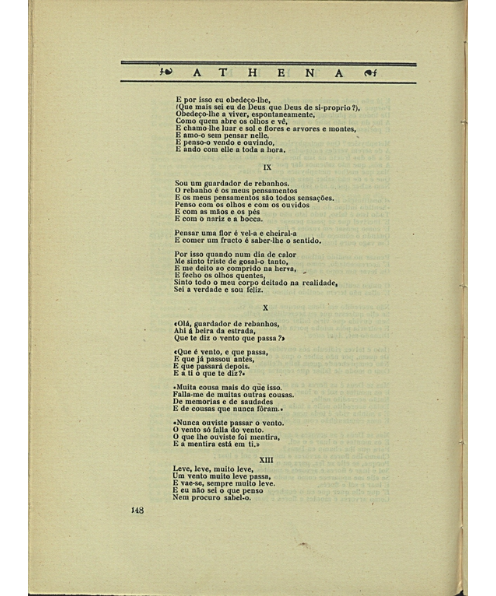
Verses of «Inconjunct Poems» (1925)
To see the fields and the river
It isn’t enough to open the window.
To see the trees and the flowers
It isn’t enough not to be blind.
It is also necessary to have no philosophy.
With philosophy there are no trees, just ideas.
There is only each one of us, like a cave.
There is only a shut window, and the whole world outside,
And a dream of what could be seen if the window were opened,
Which is never what is seen when the window is opened.
(Athena, 5, February, 1925, p. 127)
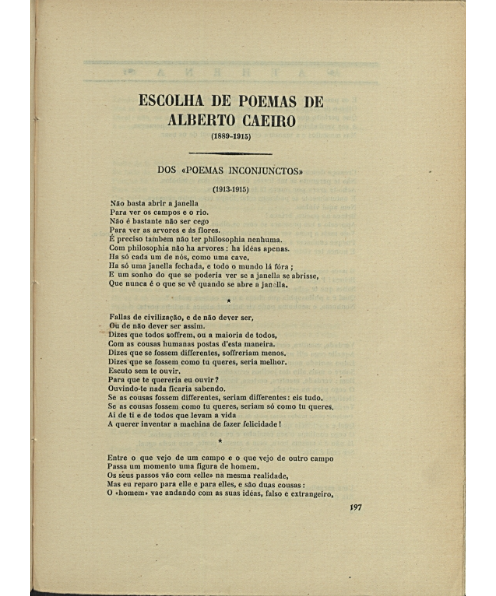
«The Penultimate Poem» (1931)
I also know how to make conjectures.
In each thing it is what it is that inspires.
In a plant it’s on the outside and it’s a little nymph.
In an animal it’s an interior distant being.
In a man it’s the soul that lives with him and even is him.
In the gods it has the same size
And the same space as the body
And it’s the same thing as the body.
That’s why they say the gods never die.
That’s why the gods don’t have a body and soul
But only a body and they’re perfect.
For them the body is the soul
And they have consciousness in their own divine flesh.
(Presença, 31-32, March, 1931, p. 10)
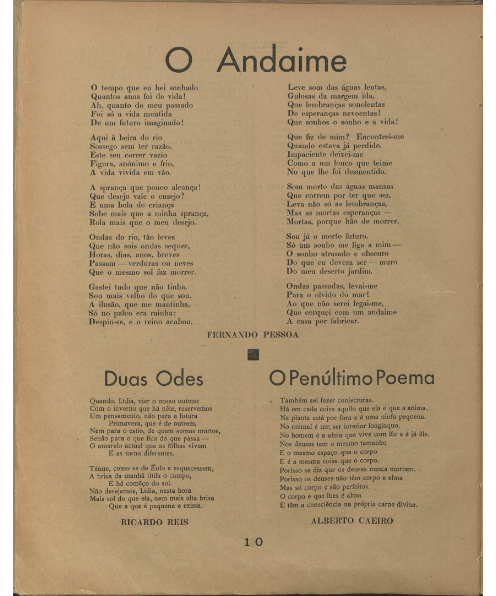
Introductory note and selection by Fabrizio Boscaglia.
_
Discover Lisbon & Pessoa, from Lisboa Pessoa Hotel.

